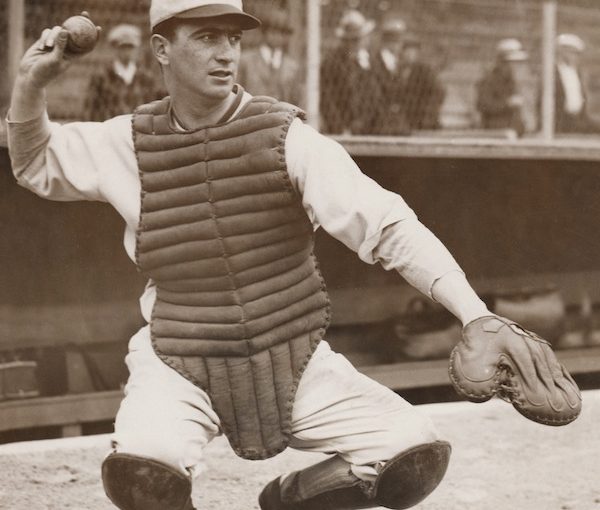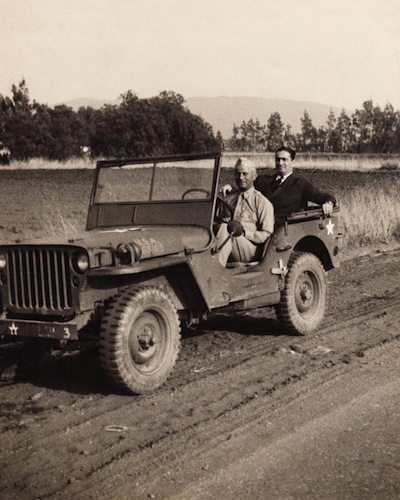Philippe Tlokinski stars in Adventures of a Mathematician. (photo from Samuel Goldwyn Films)
Forgotten your calculus? Simple geometry is more than sufficient to follow the triangular saga of Polish-Jewish brainiac Stanislaw Ulam from the cloistered classrooms of Harvard to Robert Oppenheimer’s atomic-bomb “startup” in dusty New Mexico.
The third point on Ulam’s map is Lvov, Poland, where his parents, sister and niece live in tenuous safety. Until the Nazis blast across the border and blow down the doors of every Jewish home.
Adventures of a Mathematician opens in Cambridge on the eve of the Second World War, where Stan (Philippe Tlokinski) lives with his younger brother Adam. The news trickling out of Poland gets objectively worse, but going back to Europe is out of the question. So Stan Ulam embraces another way of combating the Nazis, proffered by his best friend and fellow emigré scientist, Johnny von Neumann (Fabian Kocieki) – join a bunch of other geniuses on the top-secret Manhattan Project.
Writer-director Thor Klein’s intelligent, efficient script relies on our knowledge of the war and the Holocaust (and countless movies on those subjects) to concisely convey the gravity of the situation and, importantly, avoid the familiar clichés. At the same time, Klein skilfully involves us in Ulam’s personal life – he’s a witty man with an appreciation for gambling odds, who knows a smart woman when he meets her at a party – without trivializing the larger historical events.
Klein’s other great achievement, because of its U.S.-centred subject matter, is making Adventures of a Mathematician, which he shot in Germany and Poland with local crew, European actors and German, Polish and British financing, totally look and feel like an American film. It’s a masterful trick, which requires dedication and skill at every level of the production.
Klein makes his job easier, admittedly, by depicting Ulam as an acclimated, assimilated American rather than a European fish out of water.
Where Adventures of a Mathematician (which takes its title from Ulam’s memoir) veers from traditional Hollywood filmmaking is in the dramatic conflict. It’s not the war, which is always off-screen. Tension enters Ulam’s marriage later in the film, and we care about that relationship, but that’s not the movie’s motor, either.
Instead, Klein has made a film about philosophical and existential dilemmas, internalized in the person of Ulam – a cerebral, introverted man who largely keeps his emotions to himself, even when he is debating technical solutions with his equally stubborn boss, Edward Teller (Joel Basman).
Not many Hollywood executives would back a film whose protagonist is pitched on the horns of another triangle, namely the conflicting pulls of intellectual satisfaction, personal morality and professional ambition. Stanislaw Ulam, action hero, isn’t the easiest sell to North American audiences.
But, once you get hooked by this utterly accessible film and its remarkable central character, you’re in for a rewarding and thought-provoking experience.
A likable character for much of the film, Ulam becomes more solitary as his doubts grow about devising and building a weapon of mass destruction – especially after the Nazis are defeated.
Tlokinski’s performance, which does incorporate a ridiculous (by modern measures) amount of cigarette smoking, is never less than compelling.
Adventures of a Mathematician trusts the audience enough to omit most of the melodramatic conversations and passages endemic to a Second World War-era scenario. I’m thinking specifically of Ulam’s survivor’s guilt, which is palpable without him needing a speech or a scene to convey it.
A 2020 film whose release was delayed by the pandemic and limited to a handful of festival appearances (including the Toronto and New York Jewish film festivals), Adventures of a Mathematician solves for x with nary a misstep. It can be rented via Apple TV, and possibly other platforms.
Michael Fox is a writer and film critic living in San Francisco.



